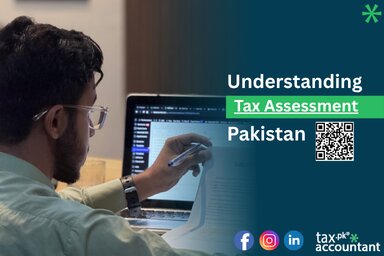Decoding Your Tax Assessment in Pakistan: A Crucial Guide
Tax assessments in Pakistan, often viewed with a mix of apprehension and confusion, are a fundamental pillar of the nation’s fiscal system. Understanding what they entail, how they’re determined, and your rights and responsibilities is paramount for every taxpayer, whether an individual or a business entity. With the Federal Board of Revenue (FBR) https://fbr.gov.pk/ continuously striving for enhanced compliance and revenue generation, staying informed is no longer an option but a necessity.
At its core, a tax assessment is the formal determination by the FBR of the amount of tax an individual or entity owes for a specific tax year. This calculation is a comprehensive evaluation based on various financial records, including income, expenses, assets, and liabilities. While the system largely operates on self-assessment – where taxpayers declare their liabilities by filing their tax returns – the FBR retains the crucial power to review and adjust these declarations.
Types of Assessments and Their Implications
In Pakistan, tax assessments generally fall into a few categories:
Self-Assessment: This is the most common form, where taxpayers voluntarily calculate and declare their income and tax payable through their annual income tax returns. The system deems this a valid assessment unless the FBR initiates further proceedings.
Provisional Assessment: These are less common and may be issued by the FBR to secure tax before the final amount due is determined, often in cases of detected discrepancies or compliance concerns.
Final Assessment: This occurs after a thorough review, potentially following an audit, where the FBR confirms or revises the tax obligations based on verified information.
The significance of these assessments cannot be overstated. They outline your tax due, form the basis for any potential disputes, and dictate further legal action if non-compliance or delays occur. Penalties, interest, and even legal enforcement can arise from unaddressed assessments.
How is Your Tax Liability Assessed?
The calculation of your tax liability in Pakistan depends on the type of income and the applicable tax regime. For individuals, income is generally categorized into five heads: salary, property, business, capital gains, and income from other sources (e.g., dividends, royalties, profit on debt). Each category has specific rules for calculating taxable income and applying relevant tax rates.
For instance, salaried individuals are taxed based on progressive income slabs, with varying rates depending on their annual earnings. Businesses and corporations are subject to corporate tax rates on their profits, which currently stand at a standard rate of 29% for most companies, though the banking sector faces higher rates (e.g., 44% for Tax Year 2025).
It’s crucial to understand deductions and exemptions available, which can significantly reduce your taxable income. These include Zakat payments, contributions to approved pension funds, and certain business-related expenses. The FBR also relies on various mechanisms like withholding tax – where tax is deducted at the source of income (e.g., on salaries, dividends, rent) – and advance tax payments to ensure timely revenue collection.
The Role of Audits and Appeals
While self-assessment is the norm, the FBR retains the power to conduct tax audits. These are meticulous examinations of a taxpayer’s financial records to verify the accuracy of filed returns and ensure compliance. Audits can be triggered by various factors, often based on risk profiling and behavioral markers identified through data analysis. If an audit uncovers discrepancies, a show-cause notice is issued, requiring the taxpayer to provide clarifications. Failure to cooperate can lead to a “Best Judgment Assessment,” which might be less favorable.
If you disagree with a tax assessment, you have the right to appeal. The process typically involves filing a notice of appeal with the Commissioner of Income Tax (CIT) within 30 days of the assessment. If still dissatisfied, you can further escalate the case to the Appellate Tribunal Inland Revenue (ATIR) https://atir.gov.pk/, an independent judicial authority. The ATIR’s decision is generally considered final within the tax system.
Recent Changes and Common Challenges
The Pakistani tax landscape is dynamic, with the FBR regularly introducing amendments. The Finance Bill 2025, for instance, has proposed changes to income tax rates for certain salaried individuals, revised general withholding tax rates, and introduced new levies like the Digital Presence Proceeds Tax. Understanding these ongoing changes is vital for accurate compliance.
Despite efforts to streamline the system, taxpayers often face challenges. These include the complexity of tax laws, a relatively narrow tax base leading to higher burdens on compliant taxpayers, and the persistent issue of tax evasion. Additionally, administrative inefficiencies and a lack of coordination between federal and provincial tax authorities can create hurdles.
In conclusion, navigating tax assessments in Pakistan requires diligence, accurate record-keeping, and a proactive approach to understanding your tax obligations. Staying informed about legislative changes, utilising available deductions and exemptions, and knowing your rights to appeal are crucial steps towards ensuring a fair and compliant tax journey. Remember, taxes are not just a legal burden, but a contribution to the nation’s development, making accurate assessment and timely payment a civic duty.
For Taxation and Business related concerns, do consult at https://taxaccountant.pk/ .














